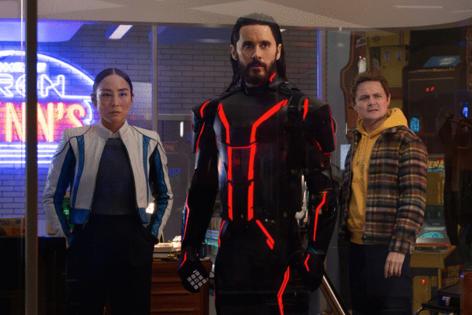Review: 'Tron: Ares' has style but suffers storytelling glitch
Published in Entertainment News
If the cult techno sci-fi films “Tron” (1982) and “Tron: Legacy” (2010) are about humans going into “the grid” of the digital world, then the newest installment in this franchise, “Tron: Ares,” is about the digital world invading our own. Allegorically, this feels right for our particular moment, the film depicting AI super soldiers wreaking a path of destruction through human cities, but despite the ethical questions the film presents, it still can’t shake the franchise's enduring techno-optimism (or inevitability), even as it encourages getting “offline.”
This iteration of “Tron” is helmed by Norwegian director Joachim Rønning, with a screenplay by Jesse Wigutow. The Flynn men, Kevin (Jeff Bridges) and his son Sam (Garrett Hedlund, who starred in "Legacy") are now out of the picture, and two warring tech companies are locked in an arms race for the future of artificial intelligence. The Kim sisters have taken over the Flynns’ company, ENCOM, while bratty upstart Julian Dillinger (Evan Peters) runs Dillinger Systems under the watchful, but ultimately powerless, eye of his mother (Gillian Anderson).
While Eve Kim (Greta Lee) searches for a message from her late sister, an AI optimist who believed in the tech’s possibility to improve human life, Julian Dillinger is 3D-printing digital tanks and “expendable” super soldiers off his grid for investor presentations. Too bad their real-world lifespan is only 29 minutes. When he gets wind that Eve has located a “permanence code” thanks to her sister’s message, Julian sends his two best soldiers, Ares (Jared Leto) and Athena (Jodie Turner-Smith) to retrieve the code by any means necessary.
If the appeal of “Tron” was its groundbreaking computer-generated imagery and forward-thinking concept, then the appeal of "Legacy" was its sleek sci-fi design and digital disco score by Daft Punk, offering more of a vibes-based experience than absorbing narrative. "Ares" tackles more story, but the style is borrowed from "Legacy," just in new colorways — Dillinger's digital squadron is cloaked in menacing red neon — and Nine Inch Nails offers up a crunchy, industrial, sexy soundtrack for the action.
But the story itself is bitten from a tale over 200 years old, one that now seems a part of our primordial DNA, or at least the DNA of the stories we tell ourselves over and over again. That is, of course, Mary Shelley’s “Frankenstein.” If the themes of creating a monster that starts to think on its own weren’t clear enough, the book is directly referenced when Ares, stalking Eve, catches a glimpse of her reading it in a social media video. As he quickly processes the book’s content, a few lines make an impression. Ares is already starting to question things, like Julian’s words about his soldiers being “expendable," and the deletion of a fellow "program" during a hacking mission in the ENCOM grid (cleverly visualized like breaking and entering). Combined with a new sensation, a “feeling” when he experiences rain, and learning about “Frankenstein," his system is primed to go rogue.
Typically in sci-fi, artificial intelligence gaining sentience means bad things for human beings. But as Eve posits in a televised interview, “what if its major malfunction is benevolence?” Optimistic, as always. What “Tron: Ares” suggests is that independent thinking can result in benevolence and empathy. It’s following the directive, by any means necessary, that results in death and destruction.
With his searching, but empty blue eyes, Leto is physically perfect for playing a questioning AI, and Lee brings her steely presence to bear on Eve, Peters the appropriately slimy essence to Julian. Turner-Smith demonstrates her "Terminator" bona fides as well. But the problem with "Ares" is the script, which spells out everything for us. There’s no subtext, room for interpretation or ambiguity, especially as it plays out like the scene of Frankenstein’s monster discovering a daisy. Wouldn’t it be more fun if we could uncover these themes on our own, without being prompted?
Rønning, who helmed a later “Pirates of the Caribbean” film and “Young Woman and the Sea,” provides serviceable direction of the material, without offering much innovation. The film loses fidelity toward the end, as it becomes a crashy, pixelated monster movie, as the real world has no capability for hosting the sleek, bloodless appeal of the grid.
Ultimately, “Tron: Ares” grapples with questions that plague us all, like how nefarious self-sentient artificial intelligence might be. It lands on the diplomatic argument that AI is only as good as the person wielding it, but doesn’t offer answers on how to ensure that (aside from a big old battle). But furthermore, it can’t answer the question of any AI evangelist: why try to make AI more human when we can just be human ourselves?
Perhaps that’s too much to ask of a sci-fi movie that should be more about style than substance. All “Tron: Ares” needed to be was a vibe, but it delivers existential questions that are pre-chewed pablum, rather than searching moral quandaries.
———
'TRON ARES'
2.5 stars (out of 4)
MPA rating: PG-13 (for violence/action)
Running time: 1:59
How to watch: In theaters Oct. 10
———
©2025 Tribune Content Agency, LLC
















Comments